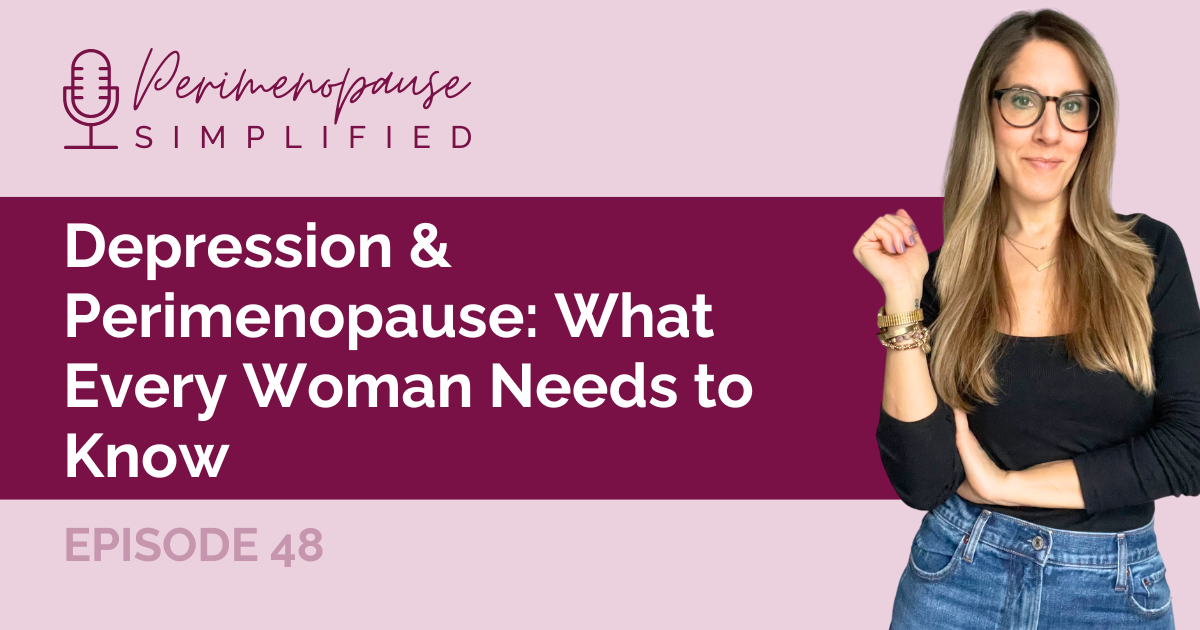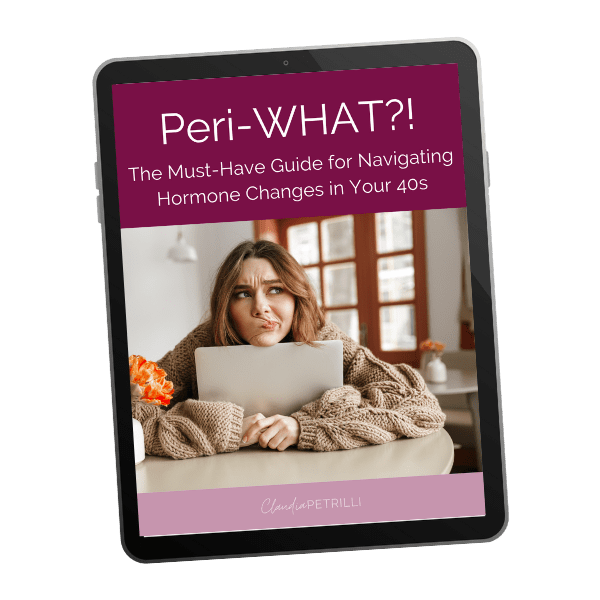
48. Depression & Perimenopause: What Every Woman Needs to Know
Don’t Miss An Episode!
In this episode, Claudia gets vulnerable, sharing her own struggle with depression, the steps she took to overcome it, and how you can navigate depression in perimenopause.
In this episode we covered:
- How hormone changes in perimenopause affect mental health
- How nutrient imbalances and gut health play a role in depression
- The life transitions perimenopause women experience
- Frustrations with your body and health in perimenopause
- The impact of unaddressed trauma
- Is it time to slow down or consider a career change?
- Steps to overcome depression including supplement suggestions
Hey, welcome back to the show. I’m so glad you’re here with me today. If you’ve been struggling with depression or feeling down in this stage of life that we call perimenopause, this episode is for you.
I want you to know, before I dig in, that I truly get it. For years, I dealt with depression, that deep dark hole that you can’t see a way out of, not wanting to get up in the morning, feeling alone, like there’s something wrong with you. Trying all the things—healthy eating, exercise, supplements, therapy, and for some, medication. But still not finding relief. And feeling frustrated and lost.
So today, I want to walk you through some of the reasons behind depression, especially in midlife, and some steps to take to feel better. Because I have been there, and honestly, I believe I’m one of the best people to speak on this topic because I struggled and I was able to overcome it. It wasn’t easy, but the dark cloud that used to loom over me is no longer there. And I so want that for you. Alright, let’s dive in.
Why Depression Hits Harder During Perimenopause
Why does depression seem to hit so much harder during perimenopause? There’s actually a number of physical reasons that contribute to those feelings of sadness, frustration, and hopelessness.
I’m sure you’re not surprised to hear hormones play a role. As estrogen, progesterone, and even testosterone fluctuate during perimenopause, your body feels out of sync. You may experience a rollercoaster of emotions—up one day, down the next. And let me tell you, this isn’t just in your head. These hormone imbalances have a profound impact on how we feel emotionally. Estrogen plays a role in serotonin production, which is your “feel-good” neurotransmitter, so when estrogen drops, so can your mood. That was one part of my experience. Because of my prolactinoma and being on hormonal birth control for years, my estrogen was tanked.
The Role of Progesterone in Mood Regulation
Then there’s progesterone, which is often referred to as the ‘calming hormone.’ When it decreases, starting in your 30s, it can make you feel more anxious, irritable, and depressed. This imbalance can create a mental fog, and you just don’t feel like yourself anymore.
Nutrient Deficiencies and Depression
But it’s not just hormones. Nutrient imbalances can also make depression worse. For instance, magnesium, zinc, and B-vitamins are all vital for mood regulation. If you’re not getting enough of these from your diet—newsflash: most of us aren’t—even if you eat a healthy diet, your body may be struggling to absorb them due to digestive issues. That can further exacerbate how you feel.
Gut Health and Mental Health
Speaking of digestion, gut health plays a huge role in your mental health. A disrupted gut microbiome, which is very common in perimenopause as our hormones shift (remember, we have hormone receptors all over the body, so every organ is affected), can throw off your serotonin production. Since about 95% of serotonin is made in your gut, gut issues are directly tied to your emotions.
Life Changes During Perimenopause
Other factors that compound depression during perimenopause include major life changes. If you have kids, they’re getting older, maybe leaving home, and your role as a mother or caretaker is shifting. At the same time, aging parents may need more of your attention, causing stress, guilt, or grief.
The Pressure of Modern Life
And let’s not forget the frustrations with your body and health—weight gain, bloating, fatigue, poor sleep, and brain fog. Add to that modern life’s constant stress, news updates, group chats, and social media. Women tend to put unrealistic expectations on themselves, and I’ve done it too.
Unresolved Trauma Resurfacing
Another layer to the emotional struggles of perimenopause is how unresolved trauma can resurface. Hormonal shifts and life transitions push us to reflect on the past. Trauma from childhood, difficult relationships, or past grief can become more pronounced during this stage of life.
Career Reflections and Fulfillment
Many women also begin questioning their careers. You might be longing for more purpose or a slower pace. Maybe you’re considering scaling back, changing directions, or exploring a passion you’ve put on hold.
Action Steps to Feel Better
Here are some actionable steps to take if you’re struggling with depression:
- Prioritize your diet: Focus on whole foods, protein, and fiber. Listen to Episode 18 for more on my recommended perimenopause diet.
- Move your body: Even a 10-minute walk can make a difference.
- Hydrate: Drink filtered water with a pinch of sea salt to support adrenal health.
- Get better sleep: Reduce electronics before bed to lower cortisol. Check out Episodes 10 and 24 for more sleep tips.
- Connect with others: You’re not alone. Reach out to someone you trust.
Supplements and Hormone Optimization
Certain supplements can be helpful, such as:
- 5-HTP for serotonin support
- Amino acids like tyrosine and tryptophan for mood
- St. John’s Wort for depression relief
For personalized supplement guidance, listen to Episode 45.
Lastly, optimizing your hormones with bioidentical HRT can stabilize your mood. When your hormones are balanced, the fog can lift.
You Don’t Have to Do This Alone
If you’re ready to create real change, my team and I are here to guide you. The Perimenopause Method is open for January enrollment, and we’d love to welcome you.
Final Thoughts
Depression in perimenopause is common, but it doesn’t have to define your life. By addressing the root causes, supporting your body, and working with experts, you can find balance and joy again.
Thanks for tuning in today. Take care, and I’ll be back next week.
Ready for a deep dive into your health? Learn about The Perimenopause Method (formerly The Hormone Rescue) HERE for January enrollment.
Links Mentioned:
Episode 18: The Perimenopause Diet I Recommend
Episode 10: Why You Can’t Sleep in Peri
Episode 24: Rethinking Sleep in Perimenopause W/ Morgan Adams (Sleep Coach)
Cure Hydration (use code: healthcoachclaudia to save 20%)
Sources:
https://www.mountsinai.org/health-library/supplement/5-hydroxytryptophan-5-htp
https://pmc.ncbi.nlm.nih.gov/articles/PMC5020390/
https://pmc.ncbi.nlm.nih.gov/articles/PMC4393508/
https://jamanetwork.com/journals/jamainternalmedicine/fullarticle/485215
Claudia Petrilli is a Functional Health Coach, Integrative Nutrition Coach, Women’s Health Educator, and creator of The Hormone Rescue program. Having experienced debilitating periods, digestive issues, a sluggish thyroid, a pituitary tumor, and perimenopause symptoms in her late 30s, she knows exactly what it’s like to get dismissed by doctors and spend years searching for answers.
Need guidance on hormone replacement therapy?:
Need guidance on hormone replacement therapy? Check out Claudia’s course: Perimenopause HRT Roadmap to learn the ins and outs of hormone replacement therapy, get empowered with easy-to-understand information & gain confidence to advocate for yourself and get the support you need!
Free Resources:
Peri-What?! The Must-Have Guide for Navigating Hormone Changes in Your 40s
Programs:
Connect with Claudia:
Have a question or episode topic suggestion? Please email: claudia@claudiapetrilli.com.
Love the show? Please subscribe, leave a 5-star rating, review, and share with others, so more women can find this podcast for guidance and support through their perimenopause journey!






